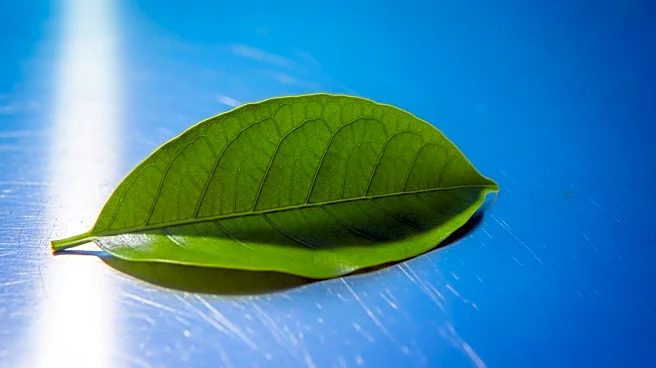What's Happening?
A recent study published in Nature explores the use of Tinospora cordifolia fractions (TCF) as a novel corrosion inhibitor for carbon steel in seawater environments. The research employed various analytical techniques, including UV-Vis spectroscopy, FT-IR, HR-MS, and NMR, to identify the bioactive compounds in TCF that contribute to corrosion inhibition. The study found that compounds such as phenols, flavonoids, and esters in TCF can adsorb onto the steel surface, forming a protective layer that reduces interaction with corrosive media. Electrochemical studies, including open circuit potential and potentiodynamic polarization, demonstrated that TCF effectively reduces corrosion rates, with inhibition efficiency increasing with concentration. The study also highlighted the impact of temperature on the effectiveness of TCF, noting that higher temperatures can reduce the inhibitor's ability to form a protective layer.
Why It's Important?
The findings of this study are significant for industries that rely on carbon steel in marine environments, as corrosion is a major issue affecting the longevity and safety of steel structures. The use of natural inhibitors like Tinospora cordifolia offers an environmentally friendly alternative to synthetic inhibitors, which can be toxic and harmful to the environment. By improving corrosion resistance, TCF could potentially reduce maintenance costs and extend the lifespan of steel structures. The study also contributes to the broader field of green chemistry, promoting sustainable practices in industrial applications. The research underscores the importance of exploring natural compounds for industrial use, which could lead to more sustainable and less harmful corrosion prevention methods.
What's Next?
Further research is needed to explore the long-term stability and effectiveness of Tinospora cordifolia as a corrosion inhibitor in real-world applications. Future studies could focus on optimizing extraction methods to maximize the concentration of active compounds responsible for corrosion inhibition. Additionally, standardizing extract formulations for large-scale applications could make TCF more feasible for industrial use. Long-term studies are necessary to evaluate the durability of its protective effects, particularly under fluctuating seawater conditions and varying temperatures. The potential integration of TCF into coatings or surface treatments could enhance the corrosion resistance of metals exposed to seawater.
Beyond the Headlines
The study opens up discussions on the ethical and environmental implications of using natural plant extracts in industrial applications. As industries move towards more sustainable practices, the use of bio-based inhibitors like TCF could reduce reliance on harmful chemicals, aligning with global efforts to minimize environmental impact. The research also highlights the cultural significance of Tinospora cordifolia, traditionally used in medicine, now finding applications in modern industrial practices. This intersection of traditional knowledge and scientific innovation could pave the way for more holistic approaches to industrial challenges.










